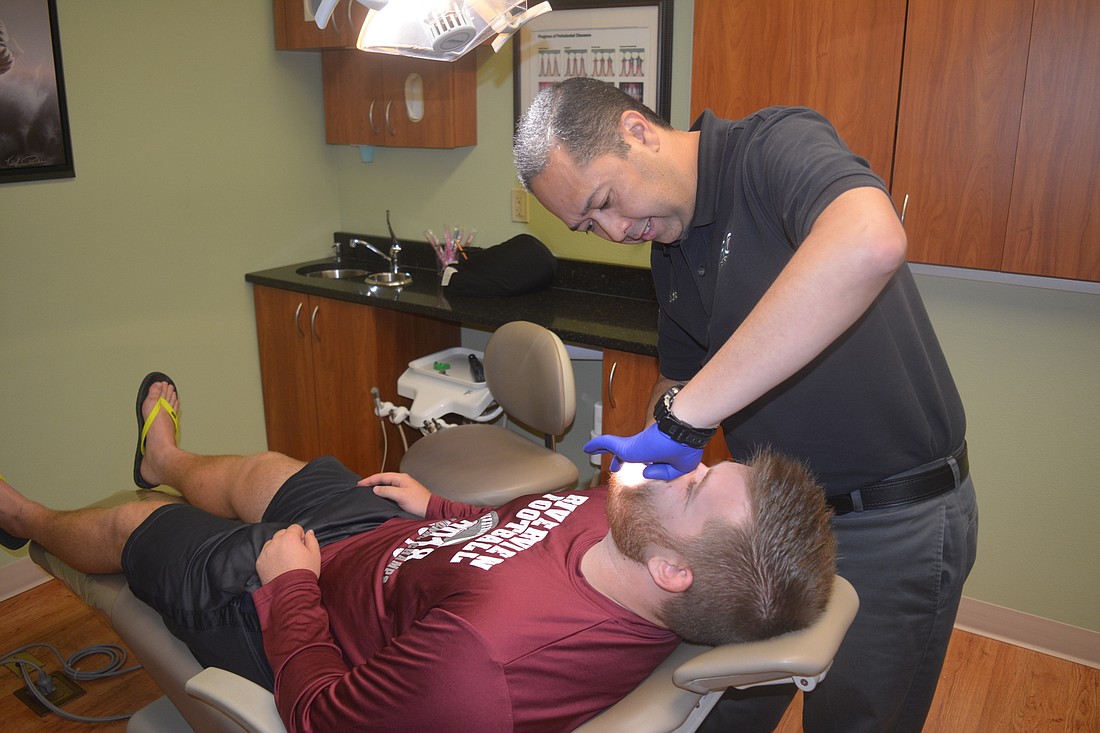- November 23, 2024
-
-
Loading

Loading

Every parent of an athlete knows the sound.
“Pow” or “thwack” or “oof” — depending on the sport. They all mean the same thing: Someone just got hit. Hard.
Dr. Apollo Lirio knows the aftermath of these sounds all too well. Lirio, a Sarasota dentist, runs SRQ Dentistry. Lirio said he often sees kids with broken teeth or a concussion in part because they use ill-fitting, store-bought mouthguards. In 2018, Lirio started Underdog Custom Mouthguards, a company designed to help kids play sports more safely.
“I want better protection for kids in our community,” Lirio said. “Most injuries occur when learning a sport, whether from falling, diving into a base or taking a puck to the face. Ninety percent of [youth sports] injuries are to the front four teeth.”
Why are store-bought mouthguards ineffective? Lirio compares the issue to running. If you run in flip-flops, your feet are going to hurt, and you are more likely to fall because the flip-flips do not stay on your feet. Running in sneakers provides the support and stability required for the activity.
It’s the same for mouthguards.
Lirio said store-bought mouthguards, especially ones marketed “ages 11 and up” or a similar slogan, stick out of the mouth and do not stay on your teeth unless you bite them. Each person’s arch, or U-shape, is different. If a mouthguard won’t stay on your child’s teeth, Lirio said, it can’t do its job. Many football mouthguards, for example, are sold with tethers to connect them to a face mask. This is only necessary because manufacturers know they won’t stay in the mouth, Lirio said.
The bottom line: If a mouthguard doesn't stay in place, it isn't protecting anything.
Underdog mouthguards don’t have this issue.
To make an Underdog mouthguard, Lirio said takes a mold of the athlete’s mouth, makes a model of their teeth from that mold then creates the mouthguard — made from layers of ethylene-vinyl acetate, an FDA-approved, BPA-free material — from around that model.
He said his process ensures the guard stays on the athlete’s upper teeth at all times, even when talking. This is safer and also allows the athlete to easily communicate with teammates, something that is harder to do when plastic is sloshing around your mouth or through a “pacifier”-style mouthguard, which blocks the front of your mouth and limits breathing. Lirio can also alter mouthguards based on an athlete's sport and needs.
Former Riverview High offensive lineman Kye Dixon, who will play for Jacksonville University this fall, has used Lirio’s mouthguards for two years. When he began playing offensive line as a junior, his previous mouthguard made it nearly impossible for teammates to understand him. Since using an Underdog, he said there have been zero problems.
“They’re amazing,” Dixon said. “You don’t even feel like you are wearing a mouthguard, just that you have a little extra something on your gums and teeth.”
Lirio said his mouthguards are available to everyone, whether a dentist patient of his or not. A youth mouthguard costs $59, and an adult mouthguard costs $79. Although this is more expensive than store-bought mouthguards, which are typically $12 to $20, it is less expensive than other custom mouthguards, which can run up to $150, he said. Plus, it evens out in the end. Lirio said athletes can go through two or three store-bought ones a season thanks to wear and tear from chewing, but his can last two years because having them stuck to the teeth reduces the frequency of chewing.
Mouthguards are the last line of defense, Lirio said, and Underdog is providing area athletes the protection they need.